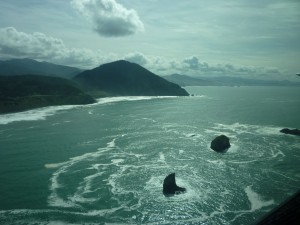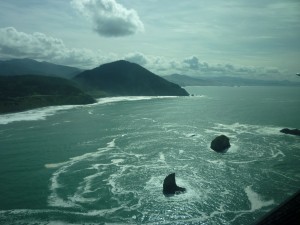
ODFW is hosting a presentation Wednesday November 6th from 2 – 3pm in the HMSC Library Seminar Room. OSU Professor Mark Needham will be presenting results from a new scientifically grounded random and representative survey of a large number of residents living along the entire Oregon coast, especially in areas near these reserves (i.e., communities of place), that assessed their knowledge, attitudes, and behavioral intentions in response to marine reserves.
 Redfish Rocks near Port Orford. photo: Gus Gates
Redfish Rocks near Port Orford. photo: Gus Gates
Abstract: In Oregon, Senate Bill 1510 was enacted in 2012 requiring state natural resource agencies to evaluate, establish, and enforce regulations on five new marine reserves in this state’s coastal waters (i.e., Otter Rock, Redfish Rocks, Cape Falcon, Cape Perpetua, Cascade Head). A number of studies have examined potential biological issues and impacts associated with these marine reserves. The process for evaluating social and economic impacts associated with these reserves, however, has primarily involved information from community evaluation teams consisting of small groups of stakeholders. Some additional data were also collected from town hall meetings with select residents, questionnaires given to a small number of specific industries and stakeholder groups, and other observational data. Taken together, these efforts mainly involved economic stakeholders and vocal residents thought to be most directly affected by the marine reserves. What has been lacking, however, is a comprehensive, systematic, and representative assessment of coastal resident perceptions regarding these new marine reserves. This presentation, therefore, will discuss results from a new scientifically grounded random and representative survey of a large number of residents living along the entire Oregon coast, especially in areas near these reserves (i.e., communities of place), that assessed their knowledge, attitudes, and behavioral intentions in response to these reserves. In addition, recommendations for future management and outreach efforts associated with marine reserves will be discussed.
To view the full report, click here.
